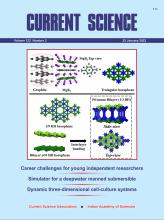Publications

|
Narendar Pani The National Bias of India’s Electoral System (NIAS/SSc/IHD/U/WP/02/2022) http://eprints.nias.res.in/2587/ Co-Authored with Debosree Banerjee and Paul Thomas. Working Paper. NIAS, Bengaluru The faith in the complete power of the majority leading to the first-past-the-post (FPTP) system followed in India’s electoral democracy has an inequality built into the relationship between political support and political power. Using vote shares as the measure of political support and seat shares as the extent of political power, this paper argues that due to the rather dispersed nature of votes received by regional and sub-regional level parties, the FPTP electoral system has benefited the national parties over others in terms of converting their votes to seats. However, this pattern need not be a permanent one, as with the growth of further regionalism, regional and local votes get concentrated, improving their ability to convert votes to seats. |

|
Debosree Banerjee Assistant Professor, Inequality and Human Development Programme Poverty and deprivation in India: Divergence between consumption and asset-based estimates https://www.epw.in/journal/2022/11/special-articles/poverty-and-deprivation-india.html In: Economic and Political Weekly, 47(11), pp. 50-56 |

|
Debosree Banerjee Assistant Professor, Inequality and Human Development Programme Conditional cash transfers to mothers, intrahousehold allocations: the role of unobservability https://link.springer.com/article/10.1007/s42495-021-00078-x Co-authored with Stephan Klasen. In: International Journal of Economic Policy Studies, 16: pp. 275-296, 2022. |

|
Anitha Kurup, Anjali Raj co-authored Mapping the life trajectories of women scientists in India: successes and struggles https://www.currentscience.ac.in/Volumes/122/02/0144.pdf Current Science.122(2):144-148 doi:10.18520/cs/v122/i2/144-148. |

|
Carol Upadhya, Supriya RoyChowdhury Professor and Head, Urban and Mobility Studies Programme Migration, skilling, and employment in Bengaluru’s new service economy Economic & Political Weekly 57(4): 40-46, 2022 |

|
Tirthankar Chakravorty Schools as 'public spheres': An experiment on citizenship education http://publications.azimpremjiuniversity.edu.in/id/eprint/4263 Students’ Journal of Education and Development (7). pp. 19-37. The National Curricular Framework 2005, among some of the major curricular documents worldwide, proposes one of the main goals of Social Studies Education to develop students' ability to think and act independently. The “Social and Political Life” textbooks by NCERT also motivate teachers to posit the school as a microcosm of society, demanding similar kinds of dialogic spaces. However, this aspect of keeping classroom discussion relevant to the socio-political context of the students gets left behind in the contemporary technocratic school environment. |

|
Ekasmayi Esha Naresh co-authored Why I said #MeToo: An Exploration of the Purpose of Disclosure Among Indian Women https://journals.sagepub.com/doi/abs/10.1177/09715215211057958 Co-authored with Dan Isaac Pothiyil, and Syam Kaithavalappil Ravindran. Indian Journal of Gender Studies, December 2021 The surge of sexual abuse disclosures by women during the #MeToo movement raised awareness about an important social issue that has garnered much attention. However, apart from the changes the movement initiated, the issue of why women chose to disclose in the context of the movement has not been extensively examined. Why women disclose such a sensitive topic in the public domain, often via social media, within the Indian cultural context, where matters such as sexual abuse are considered taboo, warrants further examination. This article explores the reasons for disclosure among Indian women participating in the #MeToo movement, through qualitative research, using the interpretative phenomenological approach. The emergent themes include reactions to the injustice, expectations of validation and closure, addressing stigma, initiation of dialogue and social change, as well as expression of solidarity, as the purpose for which disclosures were undertaken. |

|
Debosree Banerjee Assistant Professor, Inequality and Human Development Programme Poverty and deprivation in India: Divergence between consumption and asset based estimates NIAS/SSc/IHD/U/WP/10/2021 |
